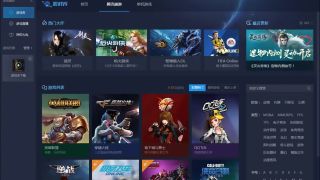China is the next battleground for Epic and Steam, but why haven't they been banned?
With no announcement, the Epic Games Store is now available in China.

This week Chinese PC gamers discovered an odd surprise: With no announcement, the Epic Games Store is now available in mainland China. Not only can Chinese gamers now play Fortnite or buy any of the Epic Store exclusives that were previously unavailable to them—often at extremely reduced prices—they even have access to popular Chinese payment methods like Alipay and WeChat Pay. But for anyone paying attention to China's turbulent relationship with videogames, the Epic Games Store's stealth launch in China raises some big questions.
How companies skirt China's censorship laws
Everything I know about the Chinese government and how they operate and about how they've treated other similar things suggests that Steam should have been blocked a long time ago.
Iain Garner
For decades, the Chinese government has enforced strict censorship regulations on its videogame market. Consoles, for example, were banned outright until 2014, which explains why China's PC gaming industry grew to such an enormous size, with almost as many PC gamers as the population of the United States. But every game that is launched in China has to first receive approval from a government regulator: The newly formed State Administration of Press and Publication (SAPP).
In March of 2018, the State Council froze all videogame approvals after it announced a massive restructuring of the previous regulatory bodies overseeing the videogames market. That freeze was only fully lifted last month, which has an enormously negative effect on China's videogame industry. Tencent, the largest gaming company in China (and the world), reportedly lost $190 billion in market value in part because of the freeze, while the entire industry was down 2.1 percent from 2017 according to Asian games market researchers Niko Partners. Facing disaster, many Chinese indie developers found salvation in an unlikely place: Steam.
For years, Valve's marketplace has operated in a legal grey area in China. Despite community features like Steam's forums and adult games being blocked by Chinese censorship, Chinese gamers can still access Steam and play games that haven't received approval for sale in China. After conducting a dozen interviews with various Chinese developers, market analysts, and publishers, no one I spoke with knows why Steam is able to continue operating in China, though rumors abound.

"It's one of the ongoing mysteries of the modern age," Iain Garner told me. He's the co-founder of Another Indie, a Taiwanese-based indie publisher with extensive experience operating in China. "Everything I know about the Chinese government and how they operate and about how they've treated other similar things suggests that Steam should have been blocked a long time ago. But it hasn't."
But the Epic Games Store entering the territory calls into question why the Chinese government is taking such a strict stance and outright banning some platforms, like Twitch, but allowing Steam, the Epic Games Store, and all their uncensored games to remain accessible to consumers.
In Steam's case, many believe it's been willfully ignored up until this point because Valve is actively working with Perfect World to release a Chinese version of Steam that would abide by Chinese regulations. That's not good news for Chinese gamers who fear that Steam China will, like Tencent's own storefront WeGame, be heavily censored and have limited range of international games. But, as of yet, Epic Games hasn't announced any plans to partner with a Chinese company to release a Chinese version of its store—in fact, it seemed outright hostile to the issue a few months ago.
The biggest gaming news, reviews and hardware deals
Keep up to date with the most important stories and the best deals, as picked by the PC Gamer team.
During a Q&A event at the Game Developers Conference earlier this year, head of the Epic Games Store Steve Allison condemned Steam's operations in China. "The way our competitor [Steam] operates offshore is not legal in China, and they don’t have an office in China. We have employees there, so we are very sensitive to what is legal and what is is not—more for the benefit and safety of our staff. We just don’t want to take any risks that can put them in any legal fire."
We reached out to Valve for clarity on its operations in China but it did not respond in time to publish this story.
I asked an Epic Games spokesperson to clarify what, if anything, led to this seeming change of heart where Epic Games was willing to operate in the same capacity as Steam in China. Epic chose not to respond to specific questions, instead giving a statement: "We look at Epic Games store as a global service and want to make it available to players in every region we can," that spokesperson said.

Friendly competition
Making matters even more complicated is that Tencent itself owns 40 percent of Epic Games. Though Epic boss Tim Sweeney has explicitly denied that Tencent has any say in how Epic Games operates, the Epic Games Store is now a direct competitor to Tencent's WeGame storefront.
But assuming the legality and competition with Tencent are non-issues, will Chinese gamers even embrace Epic Games as another platform? Part of what launched Steam's popularity in China was the meteoric rise of PlayerUnknown's Battlegrounds. In 2018, the Asian market accounted for 53 percent of PUBG Corp's $920 million in revenue. And though Fortnite might dominate PUBG globally, its mobile release in China is stuck in regulatory limbo and Tencent is unable to monetize it yet, despite it being available for download. While it's not clear how popular Fortnite is in China, multiple sources I've spoken with have said it's definitely not as popular as PUBG.
But any competition is a good thing, according to Garner. "I hope [Epic Games] are working to support the local market the same way they supported the [Western one]," he said. "They have a long way to go before they can challenge Steam and WeGame in China."
It's unclear whether Epic will pursue the same aggressive exclusivity deals for Chinese games that it's been chasing with western developers. Though, if it did, there's a big chance it could lead to the same backlash that's been surrounding Epic Games and the developers it partners with.
Chinese gamers overall aren't too impressed with the exclusivity that the Epic Store has for some of their games.
Zifei Wu
Josh Ye, a reporter for the South China Morning Post tells me that when Metro Exodus first announced it would be an Epic Games Store exclusive, Chinese gamers were just as pissed as western ones—maybe even more so. While western gamers could still play Metro Exodus (just not on their platform of choice), Chinese players had no access to Metro Exodus because the Epic Store wasn't available in China until this week.
My Time at Portia developer Pathea Games is based partly in Chongqing, China, and is one of the rare indie games that is available on Steam, the Epic Games Store, and also has a proper license to be distributed in China. "Chinese gamers overall aren't too impressed with the exclusivity that the Epic Store has for some of their games," Pathea Games' Zifei Wu told me. "There's a loyal following for Steam in China."

"But Chinese gamers are pretty price conscious," Wu added. "If there are price differences, I think that people will consider the Epic Store." Though I couldn't verify myself, Pathea Games marketing director Aaron Deng provided a screenshot of the Chinese Epic Store showing that, oddly, Borderlands 3 cost just $10 USD (a massive discount over the western price) while My Time at Portia cost $14 (which is currently the same in the West thanks to a sale on the Epic Games Store). Others are reporting that regional pricing is in effect, so Chinese users aren't forced to pay exorbitant prices.
If Fortnite doesn't attract Chinese gamers, the Epic Store's absurdly cheap exclusive games might do the trick. But the bigger question is why Epic Games is silently launching a store that appears to violate China's censorship laws months after implying doing so was a risk to its Chinese employees? And how, if at all, does that influence Epic's relationship with Tencent, who is now technically its competition in China? And just as importantly, why is the Chinese government continually allowing select foreign companies to poke holes in its censorship bubbles without consequence?
With over 7 years of experience with in-depth feature reporting, Steven's mission is to chronicle the fascinating ways that games intersect our lives. Whether it's colossal in-game wars in an MMO, or long-haul truckers who turn to games to protect them from the loneliness of the open road, Steven tries to unearth PC gaming's greatest untold stories. His love of PC gaming started extremely early. Without money to spend, he spent an entire day watching the progress bar on a 25mb download of the Heroes of Might and Magic 2 demo that he then played for at least a hundred hours. It was a good demo.
Most Popular

